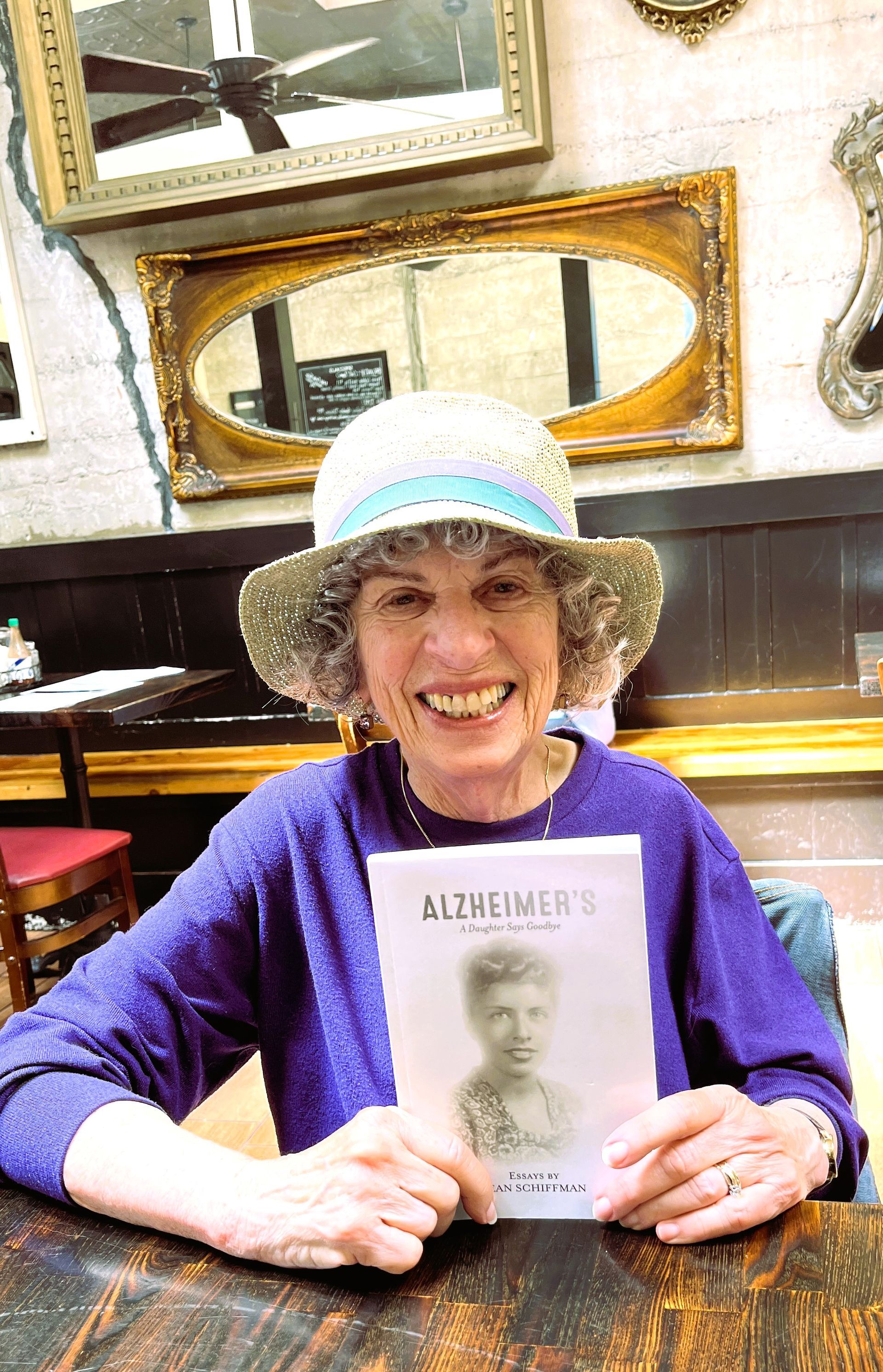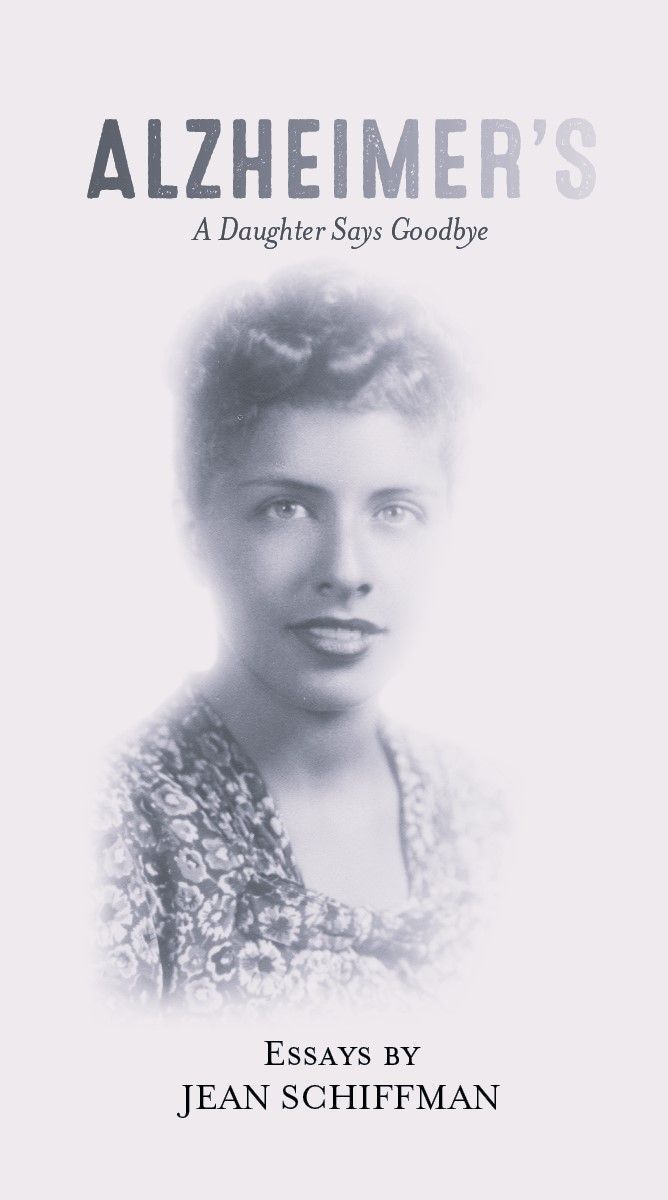Thursday's Columns
August 28, 2025
Our
Story
by
Lawrence Abby Gauthier
ace reporter
The Westphalia Periodic News

In San Francisco last week,
author Jean Schiffman
photographed by our own Culley Jane,
overseer of Westphalia's language department,
where misplaced commas go to die.
Everybody has a story that’s uniquely their own and is also the shared experience of a generation.
Jean Schiffman’s generation was born shortly after WWII; believed in the Idea of Progress; dreamed dreams because anything was possible; left home; went through the Vietnam years; raised families; paid bills; pursued careers in a busy world to get to where they wanted to be tomorrow. There was always tomorrow. Then one day they get the news — Mom has Alzheimer’s — and something is different. All of a sudden, the story has a beginning, a middle, and an end.
Because she’s a writer, Jean Schiffman wrote a book about her shared generational experience of caring for parents approaching the end. I first saw the original manuscript a couple years ago and knew right away that I wanted to publish it. The book came out this month and is available on Amazon. Culley Jane, the head of Westphalia Publishing’s language department, was in San Francisco last week to present Jean with the final creation. I stayed home to watch the cats. I've still never met Jean in person.
Although we're of the same generation (the infamous Baby Boomers), it’s amazing that our paths ever did chance to cross. I’ve been lots of places in my life, but never to her world — the San Francisco theatrical scene. Ever since graduating from Berkeley in the mid-60s, the San Francisco theatrical scene has been the epicenter of her life. I've been to San Francisco, but only as a truck driver backed into warehouse district docks. So it's no wonder we never met in person.
Our paths did finally cross only because she’s a friend of one of Culley Jane’s good friends. We got to know one another working together by phone and email on the book, final edits, getting it ready to go to press, ink on paper, not just something that can be erased forever with the flick of a switch.
After Culley Jane got back home here, where the plains come up against the mountains, I gave Jean a call there, where the land comes up against an ocean, just to talk. We're both writers. I wanted to ask her how she became one.
She had to go back to her earliest memories… walking with her grandmother in Central Park, clutching a box of Cracker Jacks in her tiny hand. There was no future. There was no past. There was only the now.
But then she started to think about who she wanted to be when she was big. At first, she imagined herself as a ballerina. Her mother would play The Nutcracker on their record player and Jean would dance and twirl on her toes around the house, free as a bird. Her parents enrolled her in a ballet school. She loved the pink tutus, but not all the rules.
Then she thought she wanted to be one of the ones who made the ice cream sundaes behind the lunch counter at Woolworth's.
And then her family — her younger sister and Mom and Dad — drove across the country to live in California. She was nine years old at the time, in the middle of the fourth grade, and her world was about to come crashing down. For the first time in her life, she felt different, isolated, unseen. Like she didn’t belong.
Growing up in Queens, New York, she never knew anybody who wasn’t Jewish. In the spreading suburban area south of San Francisco that would become Silicon Valley, she was practically the only one. When she was excused from class for Jewish high holidays, the other kids knew for sure that she was different. She retreated to the outside, looking in. And there, alone in her room, she discovered literature, the work of writers.
She said the book that influenced her the most was Louisa May Alcott’s Little Women. She identified with Jo, based on Alcott, herself. Plain, confident, outspoken, independent. Jo initially rejected the idea of romance and marriage and said so. She created plays for her sisters to perform. She wanted to be a writer.
Jean began to imagine her life as a writer, too, living in a garret in Paris with a man who was also a writer. Maybe they would marry. Maybe not — free as that little girl dancing to The Nutcracker around her mother’s skirt. Belonging. Belonging to neighborhoods, to the circles of deep thinkers who gathered at night in the Latin Quarter at sidewalk cafes along the Boulevard Saint-Michel.
Jean spent a year in Bordeaux during her college days, but then returned to the Bay Area and never left. She fell in love with acting, being seen on stage. She took acting lessons and wrote a book about the craft of acting. She edited and wrote for magazines. It was the waning years of Ferlinghetti’s generation and the beginning of something new.
Like Jo in Little Women, a character created by a writer a century before, Jean married and never stopped writing about it all. And when she got the news about her mother, she would write about that too.
“I guess that’s about it,” Jean said while we were talking the other day. “That’s how I became a writer.”
“Interesting,” I said.

Available on Amazon for $12.95
